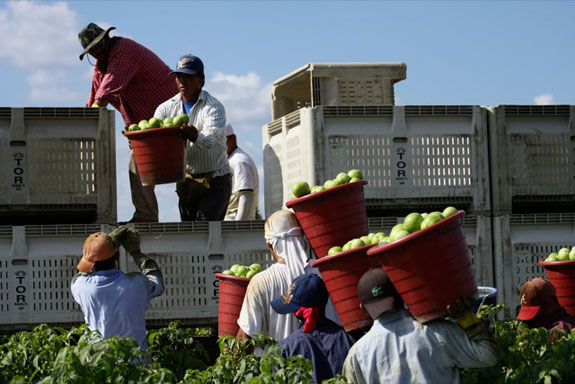
Florida famers are worried about the impact that Georgia and Alabama immigration enforcement laws will have here. (Photo by Scott Robertson/Coalition of Immokalee Workers.)
By Ralph De La Cruz
Florida Center for Investigative Reporting
You have to be fairly observant to make it in a business that’s affected by such fickle and hard-to-control phenomena as weather, bugs and human population trends.
Florida famers have seen what’s happened recently to counterparts in Georgia and Alabama and they’re scared — not about locusts, fruit flies or droughts, but rather politicians.
Over farmers’ objections, Georgia politicians passed some of the toughest immigration enforcement measures in the country earlier in the year. It allowed local and state law enforcement to require identification from anyone they suspect could be here illegally, and imposes the national E-Verify system on all employers.
The results were dramatic. A study commissioned by the Georgia Fruit and Vegetable Growers Association and conducted by the University of Georgia Center for Agribusiness and Economic Development found that, for growers of seven vegetable and fruit crops (blueberries, blackberries, watermelon, Vidalia onions, bell peppers, squash and cucumbers), the new policies resulted in direct losses of $140 million. The study estimated that the total economic impact to the state was $391 million and the loss of 3,260 jobs.
Despite the negative impact of Georgia law, Alabama politicians followed their Georgia colleagues’ lead and passed similar legislation, parts of which went into effect in the fall, with the remainder to be implemented in the spring.
Florida averted such an agricultural crisis when its immigration enforcement bill was derailed at the last minute, thanks in large part to the words and actions of a Florida farmer: blueberry grower and state Sen. J.D. Alexander.
And with traditional allies such as the Florida Chamber of Commerce and Florida Farm Bureau opposed to harsher immigration enforcement measures, Gov. Rick Scott and legislative leaders have hinted that they are in no hurry to reintroduce such legislation this year.
But now there are concerns that such laws could be foisted on Florida farmers by forces from outside the state.
Of principal concern is a bill being proposed by Rep. Lamar Smith of Texas in the U.S. House of Representatives. Smith’s Legal Workforce Act would require all employers to use E-Verify. In response, Florida farmers are trying to defeat it, urging lawmakers to create instead an effective guest-worker program.
Florida famers are also worried about the impact that the Georgia and Alabama laws will have.
In the short term, it seemed the neighboring states’ laws could be a positive for the Sunshine State, as Georgia and Alabama’s farmworkers seemed to be pushed toward the Sunshine State. However, in the long term, there’s another concern: Because laborers are now afraid to drive through Alabama and Georgia, parts of Florida’s migrant labor pool could effectively be blocked from getting here.
It’s a reminder that, at its core, immigration is not so much about numbers or statistics, but rather about real people moving along long-established migration routes to do real jobs.
Jobs in which the overwhelming number of Americans have no interest.
“This is a repetitive job for people who don’t speak the language,” Belle Glade farmer Rick Roth told Palm Beach Post reporter John Lantigua. “These people pick the crops for other people who have air-conditioned jobs.”
